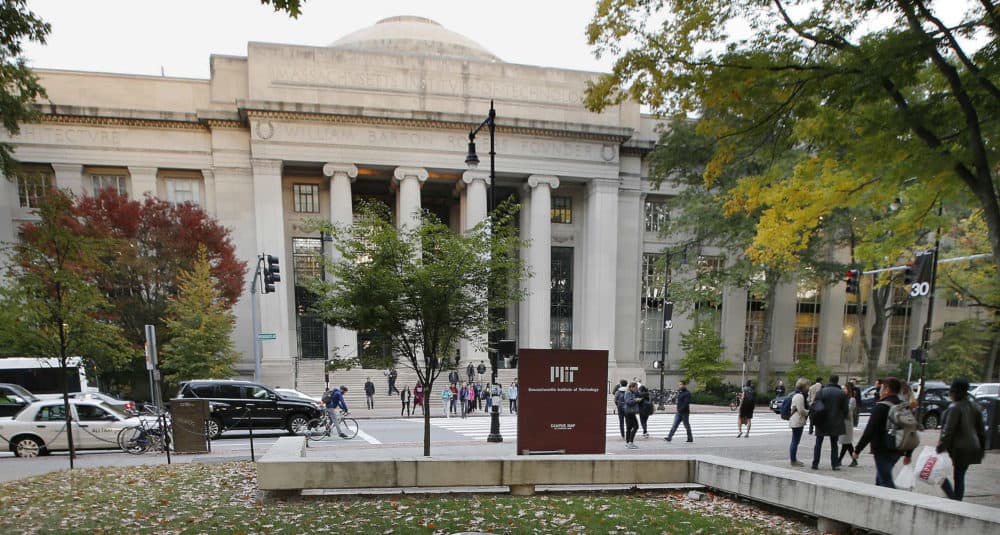Advertisement
Commentary
MIT’s investment in fossil fuels is wrong. We also think it's illegal

Last week, MIT students held a sit-in at President Rafael Reif’s office to demand that the university join peer institutions around the world in divesting from fossil fuels and reinvesting in renewable energy.
Simultaneously, MIT Divest — an organization of current MIT students — filed a legal complaint with the Massachusetts attorney general, arguing that by investing in the fossil fuel industry, the Massachusetts Institute of Technology is violating its fiduciary obligations as a nonprofit organization. Students at Yale, Princeton, Vanderbilt and Stanford also filed similar legal complaints against their respective institutions, as part of a coordinated effort assisted by the Climate Defense Project.
The University of California system, Cambridge University, the University of Massachusetts system, Harvard University and the city of Boston along with over 1,500 other educational, governmental, nonprofit and faith institutions — have all divested from fossil fuel companies in recognition of the catastrophic harm resulting from fossil fuel production. MIT, on the other hand, continues to invest an undisclosed proportion of its endowment in fossil fuel production. Until MIT stops financing the extraction of fossil fuels that are driving the climate crisis, the institute cannot claim to be a leader in addressing the climate crisis, and cannot claim to be pursuing a just and survivable future.
In its 2020 Climate Action Plan and in statements to the MIT community, the administration pledged to “activate all of MIT’s strengths” to address the climate crisis. But MIT still refuses to use two of its greatest sources of institutional power for climate action — its role as a major financial actor controlling a $27.4 billion endowment, and its reputation as a world leader in innovation and invention. By shifting capital away from pipelines, oil rigs and tanker ships and toward solar arrays, wind turbines and transmission lines, institutional investors can increase production of affordable clean energy and cut greenhouse gas emissions.
Condemnation from high-profile institutions also makes it harder for fossil fuel companies to wield political power and influence in order to prevent policies that would facilitate decarbonization.
Until MIT stops financing the extraction of fossil fuels that are driving the climate crisis, the institute cannot claim ... to be pursuing a just and survivable future.
The legal complaint filed by MIT Divest argues that MIT’s fossil fuel investments violate the guidelines for non-profit organizations set by the Uniform Prudent Management of Institutional Funds Act (UPMIFA). When Harvard University president Lawrence Bacow announced Harvard’s decision to divest from fossil fuels, he acknowledged “the need to decarbonize the economy” and Harvard administrators’ “responsibility as fiduciaries to make long-term investment decisions that support our teaching and research mission.”
MIT has ignored these responsibilities, continuing to financially support companies that have worked to undermine and obfuscate climate research, hinder the implementation of policies that would decarbonize the economy, and endanger the future of the institute’s students.
The complaint also cites significant conflicts of interest within MIT that may impact the university’s investing: Shell, ExxonMobil and Eni S.p.A. are among the “founding members” of the MIT Energy Initiative and have funded research, programming and infrastructure projects at the university. Reif served as an independent director at Schlumberger, an oil field services company, for more than a decade and the university has received more than $185 million in donations from Charles and David Koch.
But MIT still refuses to use two of its greatest sources of institutional power for climate action ...
Other institutions have recognized that investing in fossil fuel companies will not enhance long-term endowment returns or serve their educational or research mission. When the University of California system announced its intention to divest, administrators noted that fossil fuel stocks have recently underperformed the rest of the market, and are likely to be further devalued under any climate policy that stands a chance of mitigating the catastrophic impacts of climate change.
“We have been looking years, decades and centuries ahead as we place our bets that clean energy will fuel the world’s future,” they wrote. MIT, in contrast, has continued to place financial bets in favor of a future where fossil fuel companies continue to prosper by burning the vast fuel reserves they control.
For many students, MIT’s refusal to divest from fossil fuels is a stinging, personal betrayal. MIT cannot honestly say that it is committed to our future success and wellbeing while continuing to invest in an industry that is actively destroying our collective chances at a stable and survivable future. Climate change is already increasing the frequency and severity of lethal disasters such as wildfires, hurricanes, droughts, floods. Climate researchers project that without rapid decarbonization, coastal areas will be frequently flooded, hundreds of millions of people will lose their homes and/or be forced into poverty, and millions will die from causes related to extreme temperatures and air pollution resulting from burning fossil fuels. This is not the future MIT should want for its students.
This is not the future MIT should want for its students.
Investing in fossil fuels is also incompatible with the institute’s stated commitment to addressing systemic racism and racial and economic inequalities. Climate impacts and the impacts of fossil fuel production fall most heavily on low- and middle-income countries, and on communities marginalized on the basis of race or class within any given country.
MIT’s plan to decarbonize its own campus lags behind those of other universities. Whereas Stanford has invested in powering its campus with renewable energy and Columbia has pledged to stop installing new fossil fuel connections (e.g., gas connections) in new campus construction, MIT has instead invested in upgrading its on-campus gas power plant, committing to a fossil fuel-powered campus for years to come. While decarbonization on campus is arguably much less important than taking action toward decarbonization of the global economy, these disparities reveal that MIT is not treating the climate crisis as an urgent institutional priority.
Mitigating the climate crisis will not only require innovation and scholarship, but also political action and moral courage. Other institutions have begun to recognize this fact and have publicly stopped supporting the fossil fuel industry’s dishonest and destructive behavior. MIT’s investments in fossil fuels are incompatible with its ambition to contribute to solving the climate crisis, and are incompatible with its core research and educational mission. MIT must catch up with the efforts of other institutions and divest from fossil fuels now.
Owen Leddy is a third-year Ph.D. student in biological engineering at MIT. Ellie Rabenold is a third-year undergraduate student in electrical engineering and computer science at MIT.

